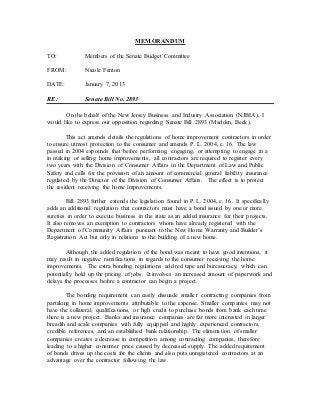
Letter of Opposition S2893
- 1. MEMORANDUM TO: Members of the Senate Budget Committee FROM: Nicole Fenton DATE: January 7, 2013 RE: Senate Bill No. 2893 On the behalf of the New Jersey Business and Industry Association (NJBIA), I would like to express our opposition regarding Senate Bill 2893 (Madden, Beck). This act amends details the regulations of home improvement contractors in order to ensure utmost protection to the consumer and amends P. L. 2004, c. 16. The law passed in 2004 expounds that before performing, engaging, or attempting to engage in a in making or selling home improvements, all contractors are required to register every two years with the Division of Consumer Affairs in the Department of Law and Public Safety and calls for the provision of an amount of commercial general liability insurance regulated by the Director of the Division of Consumer Affairs. The effect is to protect the resident receiving the home improvements. Bill 2893 further extends the legislation found in P. L. 2004, c. 16. It specifically adds an additional regulation that contractors must have a bond issued by one or more sureties in order to execute business in the state as an added insurance for their projects. It also removes an exemption to contractors whom have already registered with the Department of Community Affairs pursuant to the New Home Warranty and Builder’s Registration Act but only in relations to the building of a new home. Although the added regulation of the bond was meant to have good intentions, it may result in negative ramifications in regards to the consumer receiving the home improvements. The extra bonding regulations add red tape and bureaucracy, which can potentially hold up the pricing of jobs. It involves an increased amount of paperwork and delays the processes before a contractor can begin a project. The bonding requirement can easily dissuade smaller contracting companies from partaking in home improvements attributable to the expense. Smaller companies may not have the collateral, qualifications, or high credit to purchase bonds from bank each time there is a new project. Banks and insurance companies are far more interested in larger breadth and scale companies with fully equipped and highly experienced contractors, credible references, and an established bank relationship. The elimination of smaller companies creates a decrease in competition among contracting companies, therefore leading to a higher consumer price caused by decreased supply. The added requirement of bonds drives up the costs for the clients and also puts unregistered contractors at an advantage over the contractor following the law.
- 2. Contractors must register with the Division of Consumer Affairs in the Department of Law and Public Safety unless they fall under the exemptions listed under section three. One colliding issue is the removal of the exemption for those registered under the New Home Warranty and Builder’s Registration Act when building a new home. The exemption was created to avoid duplicate registration requirements and fees, yet also to identify contractors for enforcement purposes. Removing this exemption would create confusion since there would be multiple registration records. It would also add additional unnecessary costs without providing any more protection to the consumer. When supplementing a law with a new bill, the top priority of protecting the consumer should always remain the goal. In regards to the bonding requirement, adding extra regulations might be increasingly harmful to the client by increasing costs and delaying the pricing process. The removal of the exemption for those registered under the New Home Warranty Act would cause only confusion and no aid to the consumer. That is why the New Jersey Business and Industry Association asks that the amended components of this bill be reviewed for impact on consumer protection. Thank you for your consideration of our concerns.